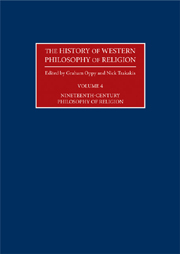Book contents
- Frontmatter
- Contents
- Editorial Introduction
- Contributors
- 1 Nineteenth-Century Philosophy of Religion: An Introduction
- 2 Johann Gottlieb Fichte
- 3 Friedrich Schleiermacher
- 4 G. W. F. Hegel
- 5 Friedrich Schelling
- 6 Arthur Schopenhauer
- 7 Auguste Comte
- 8 John Henry Newman
- 9 Ralph Waldo Emerson
- 10 Ludwig Feuerbach
- 11 John Stuart Mill
- 12 Charles Darwin
- 13 Søren Kierkegaard
- 14 Karl Marx and Friedrich Engels
- 15 Wilhelm Dilthey
- 16 Edward Caird
- 17 Charles S. Peirce
- 18 Friedrich Nietzsche
- 19 Josiah Royce
- 20 Sigmund Freud
- 21 Émile Durkheim
- Chronology
- Bibliography
- Index
6 - Arthur Schopenhauer
- Frontmatter
- Contents
- Editorial Introduction
- Contributors
- 1 Nineteenth-Century Philosophy of Religion: An Introduction
- 2 Johann Gottlieb Fichte
- 3 Friedrich Schleiermacher
- 4 G. W. F. Hegel
- 5 Friedrich Schelling
- 6 Arthur Schopenhauer
- 7 Auguste Comte
- 8 John Henry Newman
- 9 Ralph Waldo Emerson
- 10 Ludwig Feuerbach
- 11 John Stuart Mill
- 12 Charles Darwin
- 13 Søren Kierkegaard
- 14 Karl Marx and Friedrich Engels
- 15 Wilhelm Dilthey
- 16 Edward Caird
- 17 Charles S. Peirce
- 18 Friedrich Nietzsche
- 19 Josiah Royce
- 20 Sigmund Freud
- 21 Émile Durkheim
- Chronology
- Bibliography
- Index
Summary
Arthur Schopenhauer's (1788–1860) popular reputation as a pessimistic atheist has tended to obscure the appreciation of his philosophy's religious import. An individualist he surely was, but he was not iconoclastic, and he experienced a great satisfaction in the belief that his independent philosophizing cohered with the ethical doctrines of the world's major religions. Foremost in his mind were Hinduism, Buddhism and Christianity, as he understood them to express a general outlook that elevates spiritual concerns over materialistic and worldly ones.
Schopenhauer's family was not religious in the traditional sense, and it had no history of grandfathers and great-grandfathers who served in the ministry or priesthood. Successful bankers and shipowners were his immediate ancestors, and he was surrounded by cosmopolitan, mercantile and elitist values at a young age. His father, Heinrich Floris Schopenhauer (1747–1805), was a leading citizen of Danzig (Gdansk), and his mother, Johanna Trosiener Schopenhauer (1766–1838), was the daughter of one of the city's senators. Mainly owing to his father's influence, Schopenhauer was raised to continue the family tradition as a businessman and person of worldly affairs.
The world of commerce conflicted with Schopenhauer's academic disposition, and he left his business apprenticeship to devote himself single-mindedly to scholarly activities before he reached the age of twenty. This was precipitated by Heinrich Floris' death soon after Schopenhauer had turned seventeen, which partially alleviated his sense of family duty. Schopenhauer's interest in philosophy also stemmed from his heartbreaking perceptions of wide-ranging poverty – much like the experiences of Karl Marx in England some years later – during a lengthy trip through Europe just prior to his father's death. These instilled in him a sense of profound resignation, rather than social activism and indignation.
- Type
- Chapter
- Information
- The History of Western Philosophy of Religion , pp. 81 - 94Publisher: Acumen PublishingPrint publication year: 2009
- 2
- Cited by



